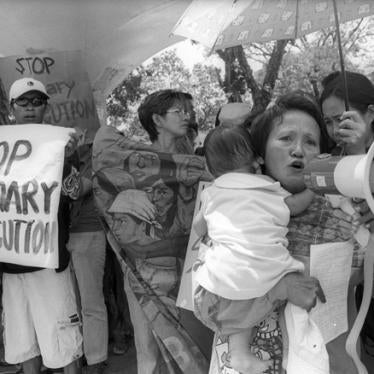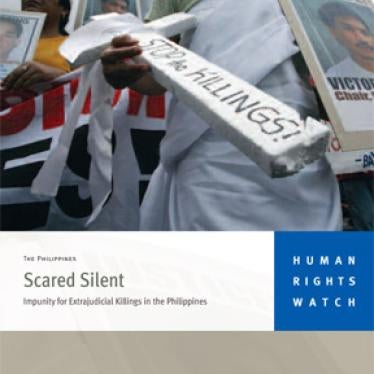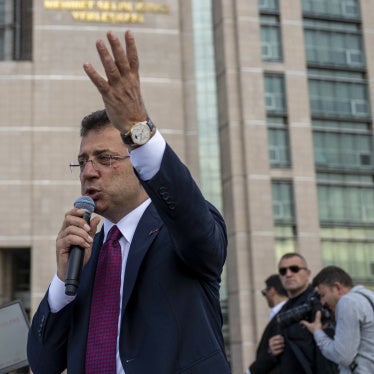(New York) - The massacre of at least 47 people in Maguindanao in the southern Philippines tragically shows the failure of Gloria Macapagal-Arroyo's administration to hold accountable perpetrators of extrajudicial killings, Human Rights Watch said today.
Given allegations of involvement by members of the security forces and local militias, Human Rights Watch urged the government to initiate a fully independent investigation led by the National Bureau of Investigation (NBI).
"Far too many people have been gunned down in the Philippines while President Arroyo has sat on her hands," said Elaine Pearson, deputy Asia director at Human Rights Watch. "The possible involvement of state forces in the Maguindanao massacre means that security personnel shouldn't be allowed to interfere in an independent investigation."
On November 23, 2009, a dozen family members of Vice Mayor Ishmael Mangudadatu of Buluan and about 40 others travelled to the government Commission on Elections office in Maguindanao, in the Autonomous Region of Muslim Mindanao, to file Mangudadatu's candidacy for governor in the May 2010 elections. Witnesses told the media that before 10 a.m., approximately 100 armed men stopped the group's convoy on a remote section of highway near the town of Ampatuan. The armed men abducted the group, which included at least 12 Mangudadatu family members, 12 journalists and two lawyers.
The authorities reported finding 47 bodies, including Mangudadatu's wife and two sisters. The bodies, bearing gunshot wounds, were found in the victims' vehicles and buried in shallow graves.
Mangudadatu told the media that because he had been receiving threats, he had sent his wife and other female family members to file his certificate of candidacy because he felt they would be safe. According to local media, he said, "I was expecting they will not harm them because they were all women." No security escorts were sent to accompany them as I trusted the police and military could protect them."
There are reports that the women were raped before they were killed. Police Chief Superintendent Felicisimo Khu told the Philippine Daily Inquirer that "all the women had their pants unzipped."
There are indications that the killings were politically motivated. A military spokesman, Lt. Col. Romeo Brawner, was quoted in news reports as having said, "The suspects are bodyguards of [Maguindanao Governor Andal] Ampatuan, local police aides, and certain lawless elements."
Gov. Ampatuan, patriarch of the powerful Ampatuan family, cannot run for re-election in the May 2010 elections because of a three-term limit. His son Andal Ampatuan Jr. is expected to run in his place. The governor has a paramilitary force that is estimated to number 500.
Philippine National Police Chief Jesus Verzosa ordered that the deputy provincial police chief of Maguindanao, Chief Inspector Sukarno Dicay, be relieved of his duties while the killings are investigated after witnesses reported seeing him with the armed men during the abduction. Concerns have also been raised about the slow response by the police and military to the abductions.
Arroyo condemned the killings in the "strongest terms" and vowed that "no effort will be spared to bring justice to the victims." However, today the presidential adviser on Mindanao affairs, Jesus Dureza, met with members of the Ampatuan family and told the media that, "They have assured us that they will cooperate fully in the investigation."
Human Rights Watch expressed deep concern that the administration's personal relationships with the Ampatuan family were likely to hinder rather than aid an impartial investigation into all those responsible for the killings.
"Ampatuan family members should be questioned by the National Bureau of Investigation, not having chats with senior presidential advisors," Pearson said. "President Arroyo's words on justice will ring hollow so long as the perpetrators of this terrible massacre remain unpunished."
Arroyo declared a state of emergency today in Maguindanao, Sultan Kudarat, and Cotabato City, giving greater powers to the armed forces, which have been implicated in numerous extrajudicial killings. Human Rights Watch called on the Arroyo administration to ensure that the armed forces uphold and protect human rights in securing these areas.
"Extrajudicial killings will continue to be a serious problem in the Philippines until they are competently, transparently, and impartially investigated, and perpetrators including members of security forces are fully prosecuted," Pearson said. "The history of election-related violence in the Philippines makes the lead up to the May 2010 elections a period of special concern."
Background on extrajudicial killings in the Philippines
Since 2001, when President Arroyo took office, hundreds of left-wing political party members, human rights activists, journalists, and outspoken clergy have been killed or forcibly disappeared, but only six cases have been successfully prosecuted. Although the military has been implicated in many of the crimes, none of the 11 persons convicted in these cases were active military personnel at the time of the killing. The killings surged after Arroyo's declaration in June 2006 of an "all-out war" against the communist New People's Army insurgency.
The Arroyo administration has not sufficiently investigated numerous extrajudicial killings in which the military has been implicated. It has yet to take strong action against local government-backed "death squads" in Davao City and elsewhere, and has tolerated unnecessary delays in investigations into these killings.








